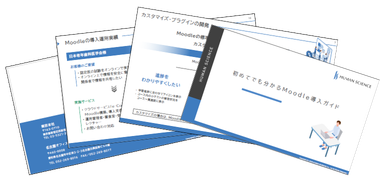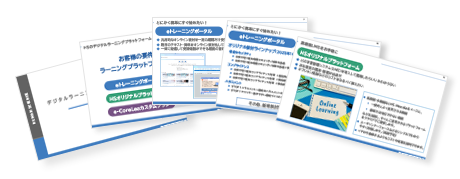2024.03.07
How Moodle is developed and supported

Moodle is an open-source software learning management system. Many people know that it is free to use. However, you may have various questions such as how it is developed, how it is operated, and how the development costs are covered.
This time, we will focus on the development and support systems of Moodle and introduce the environment that supports the operation of Moodle.
1. Who was the first to develop Moodle?
The first developer of Moodle was Martin Dougiamas from Australia. As a child, Martin lived in a desert area of Western Australia, 1,000 kilometers away from the nearest school. This was in the 1970s, long before computers became commonly used and accessible to students. Martin's family enrolled him in a flight school, where he learned through the most advanced technology of the time, shortwave radio. From this experience of distance learning, Martin developed a vision of using the internet for education.
・Incorporating education beyond physical classrooms that have changed little over the centuries
・Achieving high-quality education in every corner of the world
Based on this vision, Martin established Moodle with the belief that everyone has the right to education, aiming to create online learning solutions that are flexible, accessible, and provide high-quality education for all, regardless of whether in developed or developing countries, tailored to the needs of learners.
>History of Moodle | Moodle Docs
>The Story of Moodle | Official Site
2. What are the funding sources for developing Moodle?
Moodle is a free online learning platform. The costs associated with the development and operation of Moodle are covered in various ways.
Certified Partners:
These are companies or organizations officially certified by Moodle HQ (Headquarters). They provide various paid services such as support for the implementation and operation of Moodle, as well as customization, plugin installation, and training. Certified partners pay a portion of their revenue to the developer, Moodle HQ, which serves as a funding source for development. By engaging the services of a Moodle certified partner, you can contribute to the stable operation of Moodle.
Community Cooperation:
Moodle is supported by a vast community of developers, educational institutions, and organizations around the world. In many cases, individual developers and organizations contribute voluntarily, participating in code improvements and the development of new features.
Donations and Sponsorships:
The development of Moodle is sometimes funded by donations and sponsorships. Educational institutions and companies may be interested in the development of Moodle and provide donations or funding to support the project.
In this way, Moodle is supported by a vast community, certified partners, and supporters, which enables its development and operation.
3. What is the development structure of Moodle?
The development of Moodle is supported by a vast international community and a key organization known as Moodle HQ. Moodle HQ is based in Australia. Below are some key points regarding the Moodle development structure.
Moodle HQ:
The core development and maintenance of Moodle is carried out by Moodle HQ. Moodle HQ has a team of professional developers and staff who manage the core code of Moodle, ensure security, and develop new features.
Community Development:
A large community consisting of developers and educators from around the world participates in the development of Moodle. Community members collaborate on bug fixes, proposals and implementations of new features, and improvements to documentation. Since Moodle is an open-source project, anyone can contribute to the project.
Development Cycle:
New versions are released regularly. The release cycle includes the addition of new features, bug fixes, and security enhancements. Moodle developers are advancing development while receiving feedback from the community.
In this way, the development system of Moodle is supported by the collaboration of the specialized organization Moodle HQ and a large international community.
4. How often is Moodle updated?
Moodle is a system that is frequently updated and well-maintained. The frequency of updates is generally twice a year for major versions (e.g., 4.x) in April and October, and six times a year for minor versions (e.g., 4.x.y) in February, April, June, August, October, and December. This allows users to regularly incorporate new features and improvements, ensuring high security.
In addition, Moodle has a version called LTS (Long Term Support) that is specifically set with a long support period. Normally, the support period is about one and a half years, but for the LTS version, a long support period of about three years is set. Many users operate Moodle using this LTS version.
Version upgrades occur when Moodle developers and the community implement various improvements, including the addition of new features, bug fixes, performance enhancements, and security upgrades. Users are encouraged to upgrade their systems to take advantage of these new features and fixes when a new version is released.
You can check the specific release schedule and upgrade procedures on the official Moodle website and documentation.
5. About Moodle Plugins
Moodle allows you to add various features that are not included by default by using small software called "plugins" (extensions that can be added to Moodle). There are two main types of plugins: standard plugins and third-party plugins. Standard plugins are included in the download file when you download the Moodle software. After building Moodle, you can change the settings to use them.
Additionally, third-party plugins can be obtained from the Moodle official site’s "Plugins" page or from the developing companies (some may be paid).
The following article provides a detailed explanation about Moodle plugins.6. What is a Moodle Certified Partner?
Moodle certified partners are companies and organizations that are accredited to support Moodle projects in collaboration with Moodle HQ and provide services utilizing the Moodle platform. Certified partners provide information about how customers use Moodle and their requests to Moodle HQ, which helps in development. They also contribute to development costs by providing a portion of their revenue.Moodle certified partners typically offer services such as the following.
Implementation and Customization of Moodle:
We provide services to implement Moodle for educational institutions and companies, customizing it to meet their needs.
Training and Support:
We provide training and support for Moodle, helping users utilize Moodle more effectively.
System Integration and Development:
We provide development to extend the Moodle platform and integrate it with other systems.
Consulting:
We provide consulting to optimize educational environments using Moodle. We offer advice on effective usage and efficient operation methods.
>Plugins | Moodle Official Website
Additionally, third-party plugins can be obtained from the Moodle official site’s "Plugins" page or from the developing companies (some may be paid).
7. Summary
Moodle is developed by Moodle HQ and developers around the world, and is financially supported and operated by sponsors and donors worldwide. In Japan, Human Science Co., Ltd., a certified partner, provides both technical and financial support for Moodle. We are very pleased to be able to support you in advancing education using this wonderful online learning management system as a certified partner. Let us continue to look towards the progress of Moodle together.
Human Science has been providing Moodle services since 2008 and became an official Moodle partner in 2017. We have accumulated know-how and a wealth of implementation experience (projects: over 700, companies, schools, and organizations: over 80 cases). We offer total solutions from the introduction of Moodle (including content creation) to operational support. We also provide Moodle support services via phone and email, ensuring peace of mind for maintenance and operation. Please consult Human Science when using the open-source LMS Moodle.
Please refer to the e-learning site of Human Science Co., Ltd.
> Moodle Implementation Support and Operation
> e-Learning Material Production
> e-Learning Material Translation (Multilingual Support, Localization)
Moodle Introduction Guide for Beginners

We explain the process of introducing and operating Moodle.
For the introduction and operation of Moodle, please leave it to Human Science, the official partner. We also introduce many achievements in Moodle implementation support.
Projects: Over 866
Companies, Schools, Organizations: Over 80 cases












